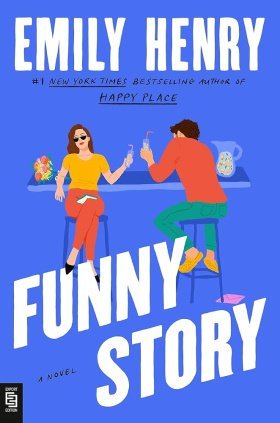“Have you always been close?” I ask.
“Pretty much,” he says. “I mean, I was, like, thirteen when she was born, so I was out of the house a lot, but when I was home, she followed me like a puppy. Like literally just crawled around after me.”
I grin, picturing it. A brown-eyed, dark-haired baby Julia scooting along after a scrawny brown-eyed teenage Miles.
“She was only five when I moved to the city,” he says. “But I tried to make it back to see her as much as I could.”
“She said you visited every Saturday, took her out.”
I catch a subtle grimace. “Just needed to get her out of the house every once in a while.”
There it is again, that crack in the box. Just as quickly, though, it’s flipped over, its contents hidden.
We fall back into silent paddling. Sweat rises along my hairline, drips down the seam of my rib cage and the ridge between my shoulder blades. “You can talk about it, you know,” I finally tell him.
“Talk about what?” he says.
“Anything,” I say. “Whatever’s bothering you. I’m actually a better listener than talker.”
“You’re a great talker,” he says. “But nothing’s bothering me. I’m fine. I just need to figure out what she’s running away from.”
“Did she say she’s running from something?” I’ve only just met her, but it’s hard to imagine Julia running from anything. “Even if she stumbled upon that black bear who was addicted to cocaine, I picture her fighting back and faring pretty well.”
“She keeps insisting she’s here to ‘be there’ for me,” he says.
“Well,” I say, “maybe she is.”
He gives me a look. “She never tells me when things are bad, but she’s not good at hiding it either.” He looks away, out toward the island, and shakes it off. “I’ll figure it out. It’s fine.”
When he looks back, he’s grinning, seemingly unbothered, though this time I’m not totally convinced. “You still good, or you want to turn back?” he asks, clearly done with the topic of Julia.
So I let it go. “I’m good.”
When the sun is high enough for the water to settle into its usual brilliant crystal green, Miles stops paddling and takes off his sweatshirt and shirt in one move, dropping them into his lap. I hold out for another twenty minutes until I can no longer stand the way my tank top sticks to me, then relent and peel it away from my bathing suit.
“It’s pretty amazing,” Miles says.
I pull my shirt off and glance over at him as I slip my life vest back on. He’s gazing toward the forested island, the last morning remnants of mist clinging to it, his kayak bumping into mine.
“It is,” I say, feeling the need to whisper it, for some reason.
He looks. “Thanks for coming with me.”
“Thanks for inviting me,” I say.
He tucks his chin, a teasing curve to his lips. “Even though you hate it?”
“I don’t hate it,” I say.
He seems unconvinced.
“I actually think I like it,” I say. “I’m just not good at it, and it stresses me out feeling like I’m making someone wait on me.”
“Why?” he says.
I shrug. “I don’t know.”
“But I don’t mind,” he says.
“You say that,” I reply.
“I’m not training for the Olympics, Daphne,” he says. “Why would I give a shit?”
“When we used to try to hike together, I’d get out of breath and Peter would—” I realize my mistake too late.
Miles probably would’ve missed the slipup, if not for the way my sentence screeches to a halt.
The corner of his mouth quirks as he reaches toward my kayak.
I shake my head, but he doesn’t slow his progress.
“No!” I shriek as he knocks me to one side. “I didn’t say it!”
“You one-hundred-percent said it,” he argues.
“Different Peter!” I cry, laughing as we struggle against each other for a minute. “Different Peter!”
“Should’ve called him Pete, then,” Miles says.

























